Artistic Personnel
The Fondazione Orchestra and Chorus, the heart and soul of the Arena and the Teatro Filarmonico
The Fondazione Orchestra and Chorus, the heart and soul of the Arena and the Teatro Filarmonico
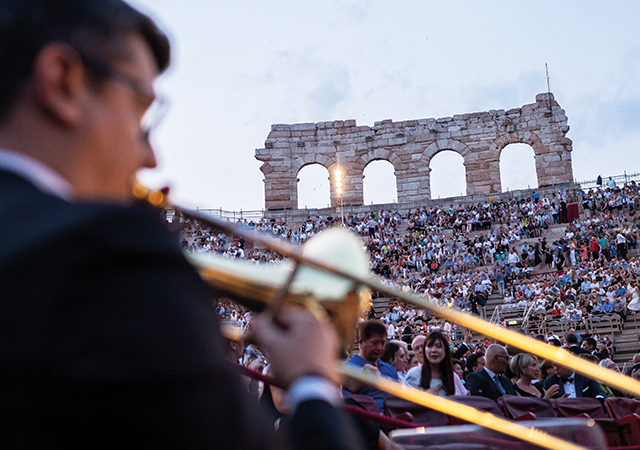
Musicians with different backgrounds, cultures and styles have all taken turns.on the podium of the world's most atmospheric open-air theatre, Among them were three conductor-composers: Pietro Mascagni who conducted Il Piccolo Marat in 1921; Riccardo Zandonai who conducted Giulietta e Romeo in 1939, and Mikis Theodorakis who conducted Zorba the Greek in 1988.
Other conductors who have led the Arena Orchestra include Sergio Failoni, Antonino Votto, Gino Marinuzzi, Vittorio Gui, Franco Capuana, Francesco Molinari Pradelli, Rudolf Kempe, Argeo Quadri, Gianandrea Gavazzeni, Lovro von Matacic, Elihau Inbal, Nello Santi, Peter Maag, Giuseppe Patanè, Michel Plasson, Anton Guadagno, Yuri Ahronovitch, Donato Renzetti, Andrea Battistoni, Gustav Kuhn, Daniel Oren, Riccardo Muti, Lorin Maazel, Zubin Mehta, and Georges Prêtre.
Since 1975, with the opening of the Teatro Filarmonico in Verona, the Arena’s Orchestra has also proven itself in an indoor theatre with a repertoire ranging from baroque to romantic and contemporary music. The activities of the artistic ensembles in the region are also intense.
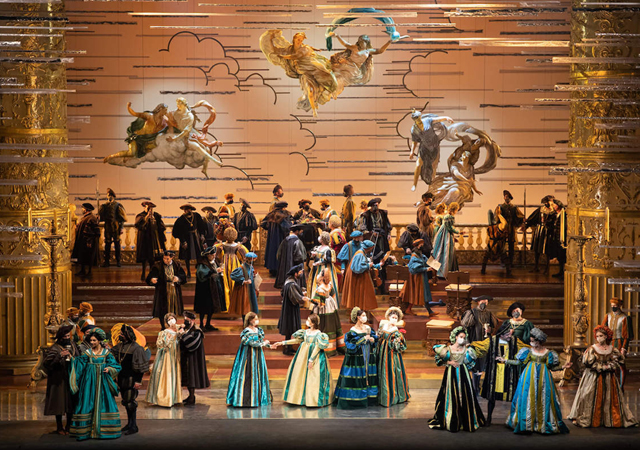
The tours abroad are important: in the 1980s in Luxor in Egypt with Aida; in Vienna and Tokyo with Aida and Turandot; in the 1990s with Nabucco in Frankfurt, Vienna, Zurich and Berlin; with La Bohème again in Frankfurt and with Aida in Dortmund.
In 2000 the Orchestra was in Beijing for Tosca; in 2010 at the Tokyo International Forum Hall for Aida and for a spectacular Gala with Plácido Domingo. In 2011 it took part in the Music Biennale in Zagreb and in the prestigious The Masada-Dead Sea and Jerusalem Opera Festival, with an opera Gala in Jerusalem and the performance of Verdi's Messa da Requiem in Masada; in the same year it starred in a grandiose Turandot staged by Franco Zeffirelli for the inauguration of the Royal Opera House in Muscat, where it returned to great success in 2014 with I Capuleti e i Montecchi, and again in 2015 with Turandot. In July 2017, the Orchestra performed a memorable concert at the Brunnenhof der Residenz in Munich to more than 15 minutes of applause.
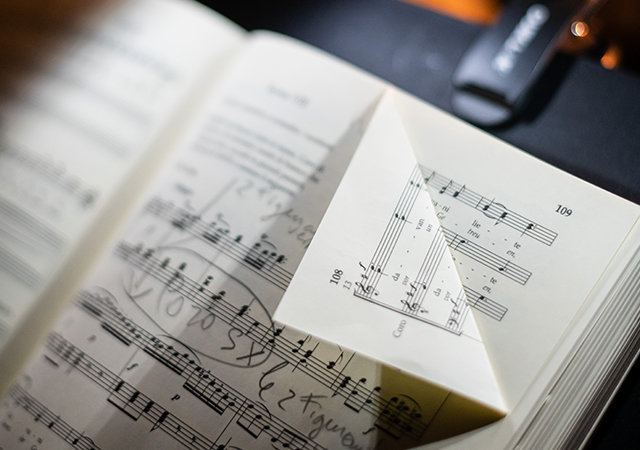
In 2018 the Arena di Verona Orchestra returned to Oman for the Opera Season of the Royal Opera House Muscat with La Sonnambula with direction, sets and costumes by Hugo de Ana in January. In September it was called to the Gala Plácido Domingo - Antología de la Zarzuela, a successful event of the 2017 Opera Festival, featuring the most exciting arias from the Spanish folk tradition.
In September 2018, it also starred in the charity marathon La notte di Andrea Bocelli, a show hosted at the Arena di Verona and broadcast on RAI 1, RAI PLAY and RADIO 2.
In May 2019, the Orchestra was a guest in Munich, making a successful return with the concert Amore & Amicizia in the Herkulessaal of the Bavarian Residenz.
2020, marked by the pandemic, saw the Orchestra resume its activities with the Summer Festival at the Arena di Verona in the unprecedented central stage set-up as the protagonist of eleven concerts to bring new repertoires to the Amphitheatre: Venetian Baroque, Mozart, Rossini, Wagner. Three more concerts in the main squares of Verona were followed by a winter season streamed from the Teatro Filarmonico, up to the 2021 Arena Festival, inaugurated with a performance of Aida in concert form under the baton of Riccardo Muti.
In January 2022, it returned to open the season of the Royal Opera House Muscat for its 10th anniversary, with a new production of Rigoletto according to Zeffirelli, also broadcast by Rai Cultura.
First Violin
Peter Szanto (di spalla)
Sofia Gelsomini *
Ozlem Adiguzel
Paolo Arduini
Michela D’Amico
Bruno Donà
Elisabetta Fable
Leonardo Giovine
Roberto Lanni
Vladimir Mari
Camillo Papitto
Mara Sistino
Second Violin
Quentin Capozzoli *
Vincenzo Quaranta *
Serena Chien
Viktor Csanyi
Antonino Enna
Ales Lavrencic
Corrado Menegazzo
Giuliana Santi
Agnese Tasso
Claudia Irene Tessaro
Violas
Giuseppe Mari *
Alberto Danelon
Massimiliano Di Stefano
Sergio Gavioli
Malgorzata Kulka
Chiara Ommassini
Cellos
Sara Airoldi *
Ilir Bakiu
Marco Venturini
Savina Zampieri
Alexander Zyumbrovskiy
Basses
Riccardo Mazzoni *
Valerio Silvetti *
Matteo Zabadneh
Flutes
Pier Filippo Barbano *
Lorenzo D’Antò *
Elisa Boschi (ottavino)
Chiara Ronchi Piccinelli
Oboes
Matteo Forla*
Francesca Rodomonti *
Fabrizio Baldon
Clarinets
Lorenzo Paini *
Giampiero Sobrino *
Bruno Matteucci (basso)
Maurizio Trapletti
Bassoons
Paolo Guelfi *
Lanfranco Martinelli *
Domenico Faccin
Emilio Gueli
Horns
Paolo Armato *
Andrea Leasi *
Oreste Campedelli
Claudio Carta
Domenico Guglielmello
Trumpets
Massimo Longhi *
Elena Foroni
Trombones
Diego Gatti *
Giancarlo Roberti *
Domenico Brancati
Bass Tuba
Giovanni Battista Micheletti
Timpani
Giovanni Franco *
Paolo Nocentini *
Percussion
Alessandro Carobbi
Mattia Pia
* Prime Parti
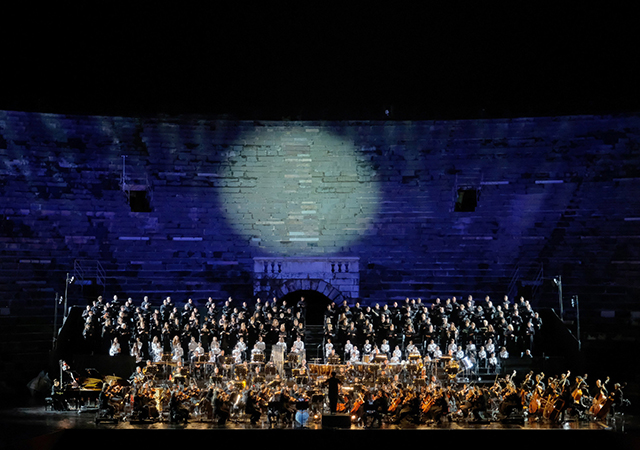
The Chorus of the Fondazione Arena di Verona was born with the start of opera performances in the amphitheatre on 10 August 1913. Its first directors were Ferruccio Cusinati and Vittore Veneziani. They were followed by Giulio Bertola, Corrado Mirandola, Tullio Boni, Aldo Danieli, Armando Tasso, Romano Gandolfi, Marco Faelli, Giovanni Andreoli, Salvo Sgrò and Vito Lombardi. Andrea Cristofolini has been other chorus master since 1995.
Since May 2023, the Chorus has been trained by Roberto Gabbiani. All the glorious moments in the Veronese amphitheatre invariably coincide with performances of operas with a broad choral scope and impressive use of massed voices. It is no coincidence that the Arena’s melodramas par excellence are those of greater use of chorus, such as Aida, La Gioconda, and Nabucco. The latter's “Va' pensiero” continues to elicit rousing ovations from the audience, which never tires of asking for an encore.
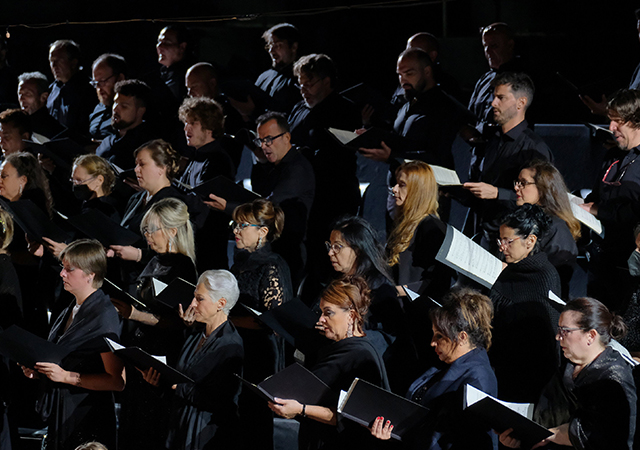
These are the great historical productions in which the Chorus has been an essential protagonist: Aida, Nabucco, La Forza del Destino, Otello, Il Trovatore, Carmen, Turandot, La Gioconda, Norma, Mefistofele, Faust, Samson and Delilah, and Boris Godunov. In addition to its fundamental contribution to the operas, the Chorus has given its own memorable concerts in the Arena: Verdi's Messa da Requiem, Beethoven's Ninth Symphony, Berlioz's La Dannazione di Faust and, Perosi's La Resurrezione di Cristo.
The Chorus also accompanies the Arena Orchestra in the winter opera and symphonic season at the Teatro Filarmonico.
To the credit of the Arena Chorus, there are also important trips abroad: to the Deutschlandhalle in Berlin in 1977-1980; the Stadthalle in Vienna in 1980, '82, and '84; Luxor in Egypt; the venues of Aida in 1987; Tokyo in 1989 and 1991; Beijing in 2000, and again to Munich, Frankfurt, Zurich, Dortmund, Hamburg and Stuttgart, up to the last two in Oman, with Puccini's Turandot, which, in 2011, inaugurated the Royal Opera House in Muscat, and with Bellini's I Capuleti e i Montecchi in 2014.
Choir Director Roberto Gabbiani
Other Choir Maestro Corradino Giovannini
Elena Benedetti
Barbara Bettari
Sonia Bianchetti
Francesca Borrelli
Carola Freddi
Mariella Geloso
Tatiana Maria Meira De Aguiar
Loredana Mele
Grazia Montanari
Sandra Pozzati
Manuela Schenale
Emanuela Simonetto
Adina Vilichi
Alessandra Andreetti
Antonella D'Amico
Elena Rita Maria Grassia
Mirca Molinari
Silvia Ruffo
Sabrina Canola
Chiara Campara
Barbara Massari
Tiziana Realdini
Tamara Zandonà
Sonia Zaramella
Alex Magri
Marco Spanu
Enrico Sammarchi
Salvatore Schiano Di Cola
Giovanni Gregnanin
Hubert Zingerle
Eder Vincenzi
Antonino Scarbaci
Gianni Scardoni
Andrea Bonaldo
Andrea Vincenti
Alessandro Andreoli
Nicolò Rigano
Simone Marchesini
Lucio Mauti
Jacopo Bianchini
Giacomo Archetti
Carlo Bombieri
Giuseppe Martinelli
Maurizio Pantò
Francesco Azzolini
Gabriele Lombardi
Raffaele Zaninelli
Alessandro Reschitz
Ezio Passerini